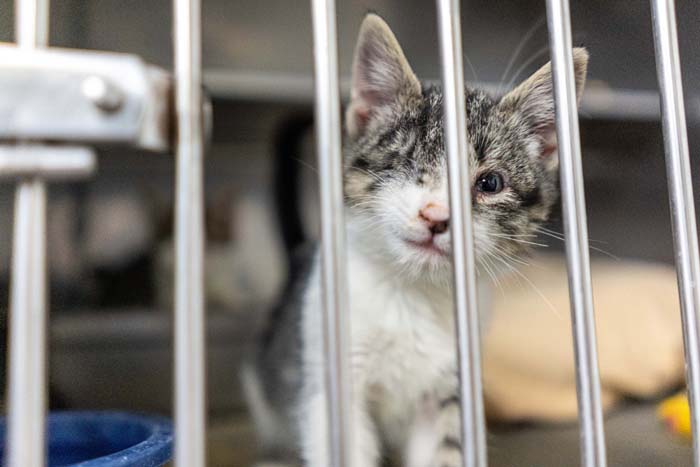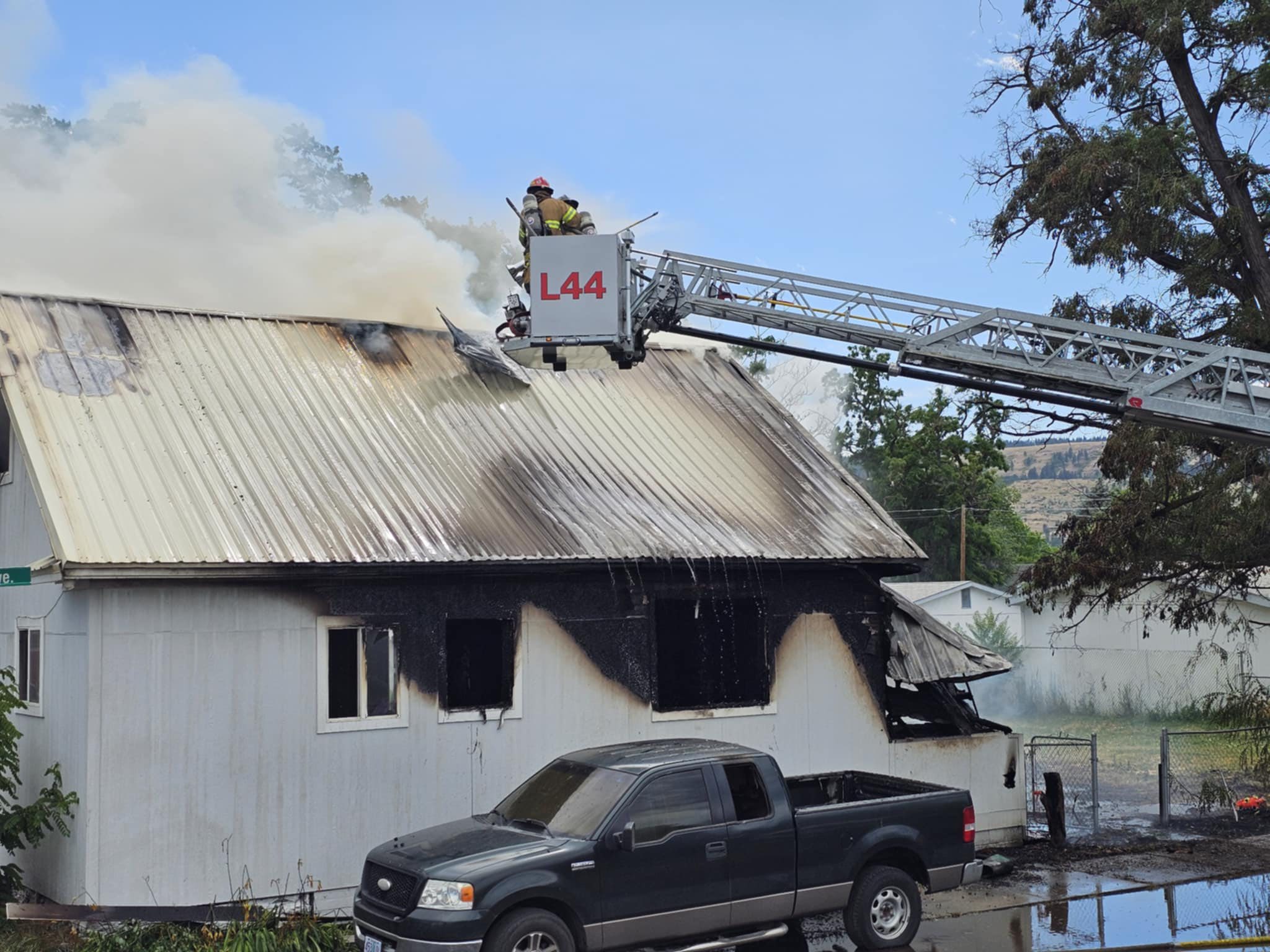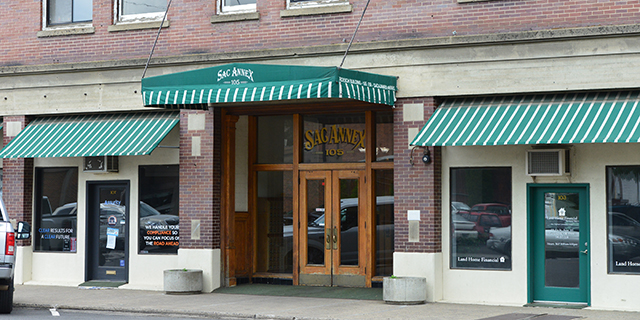Blue Mountain Humane Association making strides in second year under new management
Published 7:00 am Saturday, January 29, 2022

- A partially blind cat awaits adoption at the Blue Mountain Humane Association on Wednesday, Nov. 10, 2021, in La Grande.
LA GRANDE — The end-of-year numbers are in, marking two years of new management at La Grande’s Blue Mountain Humane Association.
After years of poor management, one of the shelter’s board’s biggest goals is rebuilding trust with the local community. Alongside that mission, the Blue Mountain Humane Association is ramping up its efforts to provide the best possible care to the animals that come through its doors.
“I think our biggest challenge, in the first year especially, was just trying to get the public to trust us again,” board member Rebecca Lord said. “We had to overcome so much bad juju from the previous administrators.”
In 2021, the Blue Mountain Humane Association recorded more than 900 intakes, of which 621 were cats and 275 were dogs. Looking back on the past year, the kitten season from April to November was larger in 2021 than most years. Through partnerships in the region and escalated caretaking procedures at the shelter, BMHA’s operations are running much smoother as the shelter continues holding itself to a higher standard.
Winning back trust
After years of the previous management team creating a poor reputation at the Blue Mountain Humane Association, new board members and staff do not blame citizens of Union County for any skepticism toward the shelter. With that being said, the organization has improved the shelter by leaps and bounds as it seeks to provide the best possible service with its available resources.
Beverly Beach, president of the BMHA’s board, noted that the facility was used as a kill shelter from the mid-1990s up until around 2012. In addition, the shelter was being lived in by the former director. The new board is now faced with the task of making the best out of limited supplies and outdated equipment.
“This place was a mess,” Beach said. “The dog kennels are kind of small compared to what you would see in a newer shelter. The dogs rarely had any time outside. That was one of the things we instituted immediately. Every dog gets outside every single day.”
According to Lord, “We found the books (from the past) and they were euthanizing dozens of animals per week. All cats that came in if they were feral, pregnant, sick or black were euthanized. All pit bulls were euthanized. They’d hold them for the minimum amount of time, which I think was three days. We started reading these records, and it was so depressing.”
Upon taking over the shelter, Beach and the new staff hauled off roughly 10,000 pounds of scrap metal, vehicles on the property and about 20 pickup loads of garbage. As part of the ongoing improvements at the facility, Beach said the board has gathered enough funding for a new exam room and that an intake room is one of the next items on the agenda.
A lack of record keeping proved costly early on, as medical and financial records are crucial in acquiring potential new funding.
“When we took over, there were no protocols or programs for the animals. There were 45 cats here and none of them had medical paperwork or even names,” Lord said. “It took us the first full year just to start putting everything in place to move forward. We were just really trying to figure out how to set all the protocols.”
Turning the corner
As the new board and staff continue to build back trust with the community, the need for volunteers and donations is still paramount.
“We’re super reliant on volunteers,” said Claire Hanson, an employee who manages the shelter. “Normally there are three staff members here every day, two people fully devoted to animal care, because it takes that much time to rotate the dogs through the yard so they all get time outside and so we can get all the cleaning done.”
Union County Animal Control is a major resource for the Blue Mountain Humane Association, Beach said.
“We love working with them. They have been so amazing,” she said. “They always have the welfare of the animals and the welfare of the shelter in mind when they’re doing things.”
“Lani Jones, the animal control officer, was instrumental in setting up dog programs and protocols,” Lord added. “She was amazing that first year.”
Blue Mountain Humane Association tallied 171 returns to owners in 2021, which Beach credits to Union County Animal Control’s extensive knowledge and connections with animals and their owners across the county.
Local pet store Petsense, another blooming connection with the shelter, also plays a key role in adding extra space for cats in a scenario that promotes their adoption. Blue Mountain Humane Association also works closely with other organizations around the state such as the Oregon Humane Society in Portland. In what Hanson described as one of the biggest cat seasons in years, Oregon Humane Society was able to transport 20-30 cats at a time to be held at their state-of-the-art facility. The shelter also works with several rescues in the Boise area.
“We’re slowly building up those partnerships,” Hanson said. “There are shelters that had refused to work with the folks that were running the place before, so we’ve had to kind of build up our reputation again and earn their trust back.”
In 2021, Blue Mountain Humane Association saw 332 animals adopted from the facility. However, that number was nearly tripled by the number of intakes — 901. BMHA has worked diligently on its trap-neuter-return program, which is widely considered the most humane method of controlling feral cat colonies.
“That’s the big hope, really. If we can get more resources going toward fixing feral cats, then we won’t get a box of kittens at our door every day during kitten season,” Hanson said. “It’s just so hard to keep up with those numbers, especially with a small shelter.”
According to the board, Union County has not conducted TNR for years, leading to an influx of feral cats in the area.
“If you do TNR for five years straight, we find that our kitten numbers will drop exponentially,” Lord said. “It makes a huge difference.”
Steady outlook
Volunteers and donations play a crucial role in keeping things afloat at Blue Mountain Humane Association, despite the COVID-19 pandemic providing yet another hurdle. The added help is vital in managing expenses related to medical services for intakes.
“If you take the numbers in what we spend on utilities, payroll, vet bills, medicine, shots and everything else all together across the 900 animals we’ve taken care of this year, it costs us $220 per animal,” Beach explained.
“The adoption fee is typically under that cost,” Hanson said. “It’s a huge dependence on donations, and we’re still trying to build up those connections again.”
The staff has been blown away by the regular support of the community in the early stages of new management, whether it be donations big or small. The facility also receives a steady stream of donations in the form of cat and dog food, as well as items for animal care.
This past fall, Blue Mountain Humane Association received a donation of a kitten incubator from Robert Castles and Linda Elegant. Incubators, which can cost several thousand dollars, keep newborn kittens and puppies warm that would otherwise be vulnerable to illness. The donation filled a massive need at the shelter.
After a busy 2021, it is clear that Blue Mountain Humane Association is trending upward under new management. While the shelter has come a long way, its staff is still aiming to continue improving the facility and eyeing potential new projects down the line.
“We’re still at that point where most of our energy is going into keeping the doors open and keeping up with vet expenses,” Hanson said. “There are big dreams, but that’s always on the back burner to just make sure we can keep up with caring for these animals.”
{div id=”highlighter–hover-tools” style=”display: none;”} {/div}
[EDITOR’S NOTE: The story has been changed to reflect a correction. The original article stated that the Blue Mountain Humane Association used to be a kill shelter, euthanizing dozens of animals per day. The shelter was euthanizing dozens of animals per week, not per day.
The article previously stated that the former president was living in the shelter, when it was the former director.]









